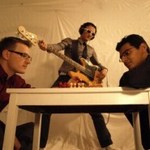city简介:The East German rock band City was raised to cult status in their native GDR in 1977 when they released a song called "Am Fenster," which hit the charts for weeks in both German states (in fact, in 2000 it was declared "the best German rock song of the 20th century" by a survey of German radio stations). This was an exceptional occurrence as during the times of German separation bands from the eastern part of Germany were usually ignored in the West. Founded in 1971 in East Berlin with Fritz Puppel (guitar, born November 2, 1944), Klaus Selmke (drums, born 1950), Ingo D鰎ing (bass guitar), Frank Pfeiffer (vocals), Klaus Witte (keyboards), and Andreas Pieper (flute), City initially did what most bands do at the beginning of their career: they played rock standards, among others songs of the Rolling Stones, Santana, and Jimi Hendrix, and nothing distinguished them from a dozen other bands active at that time.
After the departure of keyboarder Klaus Witte in 1973 the real turning point came in 1974 when two Bulgarian musicians joined the band and infused them with fresh musical input: Emil Bogdanow (guitar, vocals) was added to the lineup and Georgi Gogow (bass, violin, born July 12, 1948) replaced Ingo D鰎ing. Andreas Pieper left the band, and after a short episode with a female vocalist (Gudrun Bartels) the core lineup was perfect. It was in these days that Bogdanow conceived the idea for "Am Fenster," originally a poem by Hildegard Maria Rauchfu (born 1918) and a song which has preserved its haunting musical qualities through the decades. In 1975, Emil Bogdanow left the band and was replaced by vocalist Toni Krahl (born October 3, 1949), who -- together with Fritz Puppel -- was to become the main player of the City lineups in the next years. Due to the restrictions in record production in the GDR, it took the band a while to release "Am Fenster." The single, released in 1977, immediately became a hit in both German states, so did the accompanying debut album City (1978) which contained an extended 16 minute version of the song. Having such a smash hit at the beginning of a band's recording career is not always a blessing, and in the case of City, it surely was not. Emil Bogdanow, the brainchild of "Am Fenster," had left the band, and it was suspected the band could not deliver equally strong material. Their second release, Der T鋞owierte (1979), however was a good record although there was nothing on it which possibly could match the impact of their very first hit.
The success of "Am Fenster" had made City well-known in West Germany, and on one of their tours they were asked by American producer Jack Riley if they wanted to do a record for the English-speaking market. The band agreed and released the weak Dreamer (1980), which contained previous songs with English lyrics, arranged by Riley who didn't seem to be on the same wavelength with the band. For the recording of this album, City had furthermore expanded their lineup with the keyboarder Rüdiger Barton and an additional guitar player, Gisbert Piatkowski. In 1981, City received a golden record for the sales of "Am Fenster" in Greece, but this could not hide the fact that the band was in a crisis: That same year, Georgi Gogow, who with his violin playing had given their hit "Am Fenster" its unique sound, left City (together with Piatkowski and Barton -- the latter would join Silly) and founded his own band NO 55, which was only to be a footnote in GDR rock music of the '80s. The remaining members (Fritz Puppel, Klaus Selmke and Toni Krahl) decided not to hire a new bass player and violinist but rather a keyboarder, Manfred Hennig (born 1952). This meant a change in style: City's music became dominated by keyboards, the initial mix of folkish hard rock flavor was gone. The first two albums recorded by the new lineup, Unter der Haut (1983) and Feuer im Eis (1985), did not offer any exciting material but a mix of pretentious songs coated in thick keyboard layers. Compared to the standard of their first two albums, they were blunt disappointments. Casablanca, released in 1987, was some grades better. The band didn't abandon the keyboard sound but employed it in a much more thoughtful way, and the lyrics were dense and provocative. In the same year, City received a golden record in West Germany for the sales of "Am Fenster."
In 1990, Klaus Selmke left the band. Nevertheless, the album Keine Angst, released the same year, continued the attempt of presenting witty lyrics -- it contained German versions of Randy Newman's "Baltimore" and Jimi Hendrix' "Hey Joe." After the release of this record, Manfred Hennig's departure made City virtually a torso consisting of guitarist Fritz Puppel and vocalist Toni Krahl. After two years, the two musicians laid the band to rest and founded their own record company K & P Music, which apart from their own music was intended to release albums of young East German artists. 1992 marked a new leg in the band's history: After more than ten years, Georgi Gogow found his way back to City, and drummer Klaus Selmke rejoined too, thus reviving their most successful lineup of the '70s. In 1995, Manfred Hennig rejoined the band. After five years of various "Best Of" tours presenting old material to the audience, they eventually released Rauchzeichen (1997), a new album which was a fair comeback effort created with the inspirational involvement of the Silly masterminds Uwe Hassbecker and Rüdiger Barton. The same year, City was awarded a platinum record for the sales of their hit "Am Fenster."





